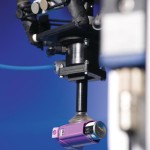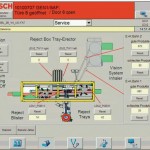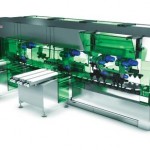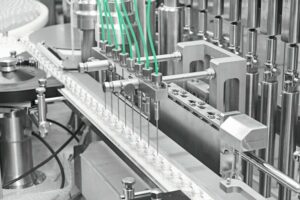GMP-compliant production demands a holistic view of all relevant areas. Quality cannot be “inspected” into a product. Taking a risk-based approach, it is vital to look at systems differently and to include a relevant degree of safety in the production process. Given the challenges faced by today’s pharmaceutical manufacturers and the requirement to conserve resources, the motto should be “as much as necessary”, not “as much as possible”.
The author: Andreas Schildknecht Product Manager Pharma, Bosch Packaging Systems
According to EC guidelines on Good Manufacturing Practice (GMP), Part I, drugs shall be manufactured in a manner to prove ability to guarantee their suitability for the intended use. But how much effort regarding hygiene, safety, quality and documentation is appropriate, or indeed necessary, to achieve this goal? More than ever before, today’s pharmaceutical industry has to balance GMP requirements with business principles. Knowledge-based and early-stage risk management are key to an integrated system design guided by GMP principles.
Regulatory requirements stretch much further than mere aspects of hygiene. The focus is constantly shifting to other new topics. System suppliers are now involved in the early stage of a project to identify non-critical areas in order to compile a differentiated URS (User Requirement Specification), which takes GMP demands into account and optimizes costs.
Increased market and regulatory requirements concerning compliance and convenience for packaging as well as new dosage forms mean that pharmaceutical packaging is now much more diversified than the traditional blister pack. At the same time, global market activities and demographic changes have led to highly diverse patient demands and smaller batch sizes. Nowadays, the legislative authorities prefer a risk-based approach, so a thorough analysis of the value chain is crucial. Preference should be given to risk avoidance rather than only to the detection of potential errors.
Flexibility is a major challenge on modern packaging lines where a stable and safe manufacturing process is required. The following section outlines some measures to implement GMP-compliant production. By modifying and expanding a blister line with Delta robots, it becomes possible to produce different variations of a combi-pack.
Apart from the risks associated with product handling, such as damage to the sensitive Alu-Alu blisters or cosmetic defects to inhalers, process steps where quality related decisions are made were analyzed. To support this, a process flow chart was created. This facilitates software design and also forms the basis for a GMP-compliant description of all packaging processes and associated operations. During the course of the project, this form of presentation proved beneficial and was also used when planning for qualification procedures. GMP operations and checks during assembly largely reflect GMP requirements and benefit from the involvement of the supplier in the qualification process.
High process reliability with GMP design
An integral design structure results in high functionality and minimizes non value-adding processes. Manual intervention in packaging material infeed operations is also reduced. Dead spots, which are a potential contamination risk and might cause mix-ups, are eliminated. The chain support units have been designed as narrow as possible and any products falling off are moved to outer areas of the cell where they are visible and can be easily removed. Faulty products are transferred to a lockable reject container, so that only products rated as suitable will leave the packaging line.
The Delta robots are directly driven by three servo motors. Sealed enclosures ensure that products are not contaminated by dripping oil while the grippers can handle all relevant formats. Simultaneously, a blister robot feeds a storage unit and the inhaler gripper stabilizes the upright tray.
The storage unit consists of six independent servo-motor blister chambers. These are loaded and unloaded by the robot, which also separates the blister unit from the cartoner. This design not just enhance equipment effectiveness and availability but also ensures a stable and continuous production flow together with consistently high quality levels.
According to the GMP terms, reprocessing is rated as critical and should be avoided if possible. However, if required, a repeatable process should be established. Here, the storage unit serves as an interface for the defined and safe reinsertion of blisters into the packaging process.
Pharmaceutical manufacturers should minimize the risk of mix-ups and similar errors. It is vital to ensure that no materials are left in the machine at the end of batch runs, that in-process controls and identity checks are conducted and that electronic devices such as code readers are in good working condition. Modern packaging lines offer clearly structured line clearance procedures as well as production reporting. Sensors programmed for fail-safe operation carry out a continuous self-diagnosis while vision control systems are able to identify all forms of packaging materials and verify variable print data.
GMP-compliant process automation
FDA/GMP compliance for production-related IT systems is of particular significance for today’s packaging systems. In view of demands for high-performance control systems, increased ease of operation and efficient storage of process data, the Industry PC (IPC) is gradually replacing or supplementing Programmable Logic Controller (PLC) systems.
The Code of Federal Regulations Title 21 (21 CFR part 11), implemented in 1997 by the FDA, regulates the handling of batch documentation, which is recorded, administrated, stored and/or signed exclusively in electronic format. This provides an opportunity to reduce manual paperwork; but it does, however, require a valid IT system. In accordance with the European Commission’s publication of the revised Chapter 4 of the EU GMP guidelines (effective from 30.06.2011), the SFM (Site Master File) is mandatory for pharmaceutical manufacturers. Appendix 8 illustrates the requirement to mark GMP-critical components and to list relevant computer systems.
A computer-based user management system can also provide a proof of compliance, which is required by GMP regulations to indicate the use “competent employees”. This means that operators can be given permissions that relate to their level of qualification.
Pharmaceutical installations must provide high process reliability over their entire life cycle and must demonstrate a proven fitness for use. This applies equally to routine operation as well as periodic critical revalidation. Repair and maintenance should always ensure product quality, not compromise it. This requires regular maintenance operations as well as early detection of defective equipment. Modern human-machine interfaces can assist with diagnosis and troubleshooting, and also with the planning and implementation of maintenance measures. It is also vital to plan and prepare for future upgrades of the installation.
Operator Protection
Finally it should be stressed that operational safety is an important, GMP-relevant aspect. Especially when dealing with highly potent or sensitizing substances such as powders for inhalation, special zone concepts and/or the use of RABS (Restricted Access Barrier Systems) may become necessary. Using closed cells can also help minimize the contact of staff with such substances in the event of damaged blisters. It also avoids hazards caused by impact during operation.
Hall 1, Booth 337
Online-Info: www.cpp-net.com/0311418
Share:










